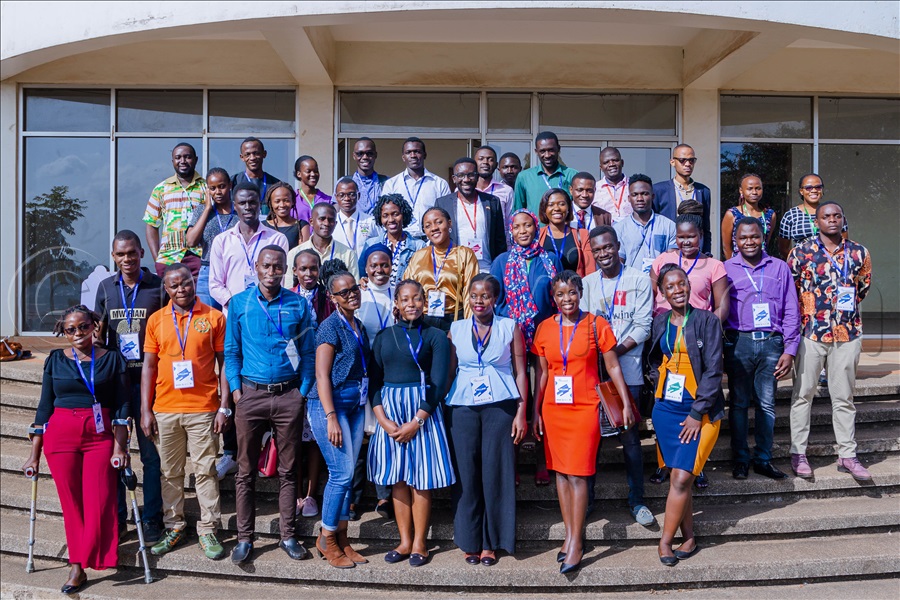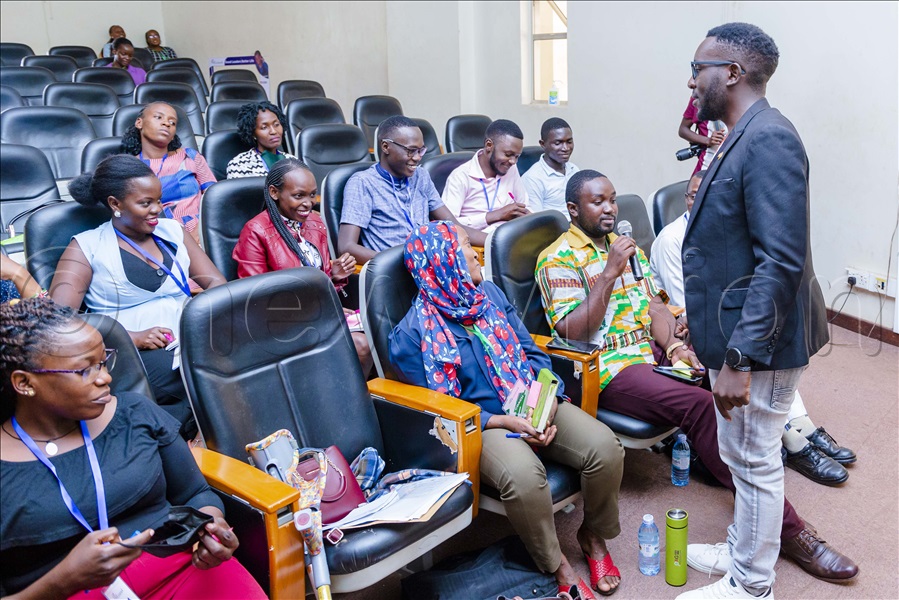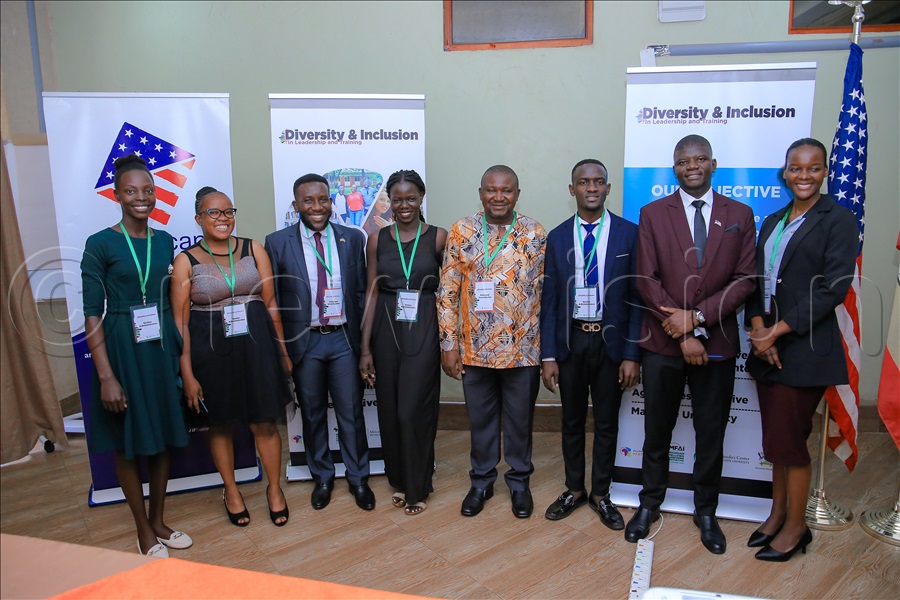After completing their studies at Michigan State University in the US, 11 Ugandans passionate about agriculture returned to Uganda and started an organisation that has seen hundreds of businesses thrive and livelihoods improved, writes Jovita Mirembe.
In 2018, a group of young Ugandan students who had attended Michigan State University in the US, had one big dream.
They desired to empower fellow youth and women, particularly those engaged in agriculture to get handsome returns from their enterprises.

“We were 11 Ugandan students who had gone to study in the US on different programmes at Michigan State University. When we returned to Uganda, we came with one of our American friends and formed an organisation in 2019.
“We came up with a programme for fresh graduates and the youth involved in agribusiness to enhance their livelihood and communities through networking,” Raymond Musiima, one of the group’s co-directors, says.
They formed Michigan Fellows Agribusiness Initiative (MFAI).
MFAI was registered as a non- profit organisation. Each of the initial members contributed whatever they could afford, which totalled sh1.8m.
With this, the members made a call on their social media platforms and contact persons for the youth, women and fresh graduates countrywide to apply for skilling in agribusiness.

All the applicants were interviewed and the successful candidates, 10 youth, were taken to the American Centre in Kampala for a one-week training in agribusiness skills to enable them start their own businesses.
“The participants were awarded with certificates of completion,” Musiima says.
Setting up a SACCO
For sustainability, the team decided to set up a savings group in 2020.
They named it Michigan Fellows Agribusiness Initiative Savings and Credit Co-operative Organisation (SACCO) Download now located on Bukoto Street, Kampala.
The SACCOS has a board of 12 directors, with only three running it. The three co-directors include Musiima (programmes), Marion Namukose (finance) and Samuel Kiggundu (business).
Musiima says the group’s objective is to provide agribusiness extension services and capital to the youth and women. They also offer literature such as practical guides to farmers.

“We offer essential technical and soft skills that enable women to earn a decent income, manage their finances and provide for their families. We engage in agricultural work through professional training, community outreach and financing programmes such as the Agribusiness Apprenticeship Programme, Schools and Community Demonstration Farms initiatives and last-mile finances (last stage in a process, especially of a customer buying goods) through the SACCOS,” Kiggundu says.
The other trainings conducted include a short online financial management literacy programme for members to effectively manage finances, record and account for funds and make data-driven financial decisions.
“In so doing, we create innovative investment pathways for emerging agribusinesses to survive and thrive,” Namukose says.
“MFAI’s culture revolves around the personal initiative approach which entails three aspects — self-starting, proactivity and persistence,” Musiima says.
Over time, the group has realised the link between good health and survival of the enterprises they partner with.
Kiggundu says the SACCOS, therefore, implements a health programme for the beneficiaries.
This includes a nutrition and value-based health restoration initiative that focuses on pregnant women, lactating mothers, as well as victims and survivors of sexual, gender-based violence.
“We provide coaching, career guidance and counselling to young people with mental health challenges such as drug addictions, bullying and torture. We offer professional literacy programmes and coaching for young leaders, project management, civic participation and fundraising,” he says.
Earnings, expenditure, labour
Kiggundu says the SACCOS gets sh3m from interest annually. The organisation has eight staff with three part-time, employed across three departments — business development, programmes and research.
“We work with five to eight volunteers who train, mentor beneficiaries and conduct community engagement work such as site visits, follow-ups and project promotion, depending on how big the project is. We facilitate them during training and SACCOS activities,” Kiggundu says.
Regarding expenditure, Kiggundu says they spend sh10m on facilitation expenses, sh6m on rent and sh5m on communication and administration in every annual project.
Challenges
Musiima says the key challenge is limited funding to sustain projects alongside the day-to-day administrative costs that include meetings and rent.
“We get some funding for our projects which have specific time frames. When the grant period elapses, it is financially constraining to continue with the project, causing a sustainability gap. Another challenge is ineffective monitoring and evaluation to ascertain member business continuity, productivity and performance.
Musiima says there are cases when some members misuse the resources, causing the SACCOS to suffer losses.
Risks
Namukose says their main source of income is interest accrued from loans. Therefore, when borrowers do not repay, the SACCOS loses both the principal and interest.
She says MFAI guards against fraud and defaulting on payments through their finance policy that denotes the procedures on how funds are received, recorded, disbursed and accounted for.
Kiggundu says management sensitises members on the impact of loan defaulting on the organisation and all stakeholders.
He says they encourage group savings and loans to increase commitment to repayment, reminders among peers and intelligence on likely defaulters.
Impacts of COVID-19
Kiggundu says owing to the restrictions imposed due to the COVID-19 pandemic, they were unable to meet physically, hampering their activities, schedules and funding.
“Participants were engaged virtually, which called for internet data at their expense,” Kiggundu says.
At the time of the pandemic, the SACCOS was at its ideation stage and registration.
“Most of the government offices were closed, physical planning meetings were not possible due to the banning of public transport.
MFAI achievements
More than 300 youth are trained annually in the various projects. A large percentage of these are now engaged in agribusiness, Namukose says.
She adds that these youth have also become leaders, social enterprise founders, entrepreneurs and philanthropists.
The organisation has built a network of individuals and organisations engaged in agribusiness, which Namukose says has been key in furthering MFAI’s cause.
“The professional networks ensure that beneficiaries remain connected to MFAI, active and participate in ongoing projects as mentors, peer educators and influencers. The networks are key indicators of the positive change created by MFAI projects in Uganda. Alumni of these projects are periodically profiled and recognised for their exceptional accomplishments as they may emerge in their communities,” Namukose says.
Since 2018, Musiima says, the organisation has grown as more fellows from subsequent cohorts join and also recruit young professionals across Africa.
He says MFAI has fostered friendships and professional relationships among young professionals across the continent who continue to make remarkable progress as leaders in their communities.
“The impact is that young people are able to work together, leverage opportunities and use innovation to address dire life challenges, particularly for the marginalised populations,” Musiima says.
Plans
MFAI targets to reach the whole country and African continent at large in providing solutions to agri- innovations in the next 10 years.
What alumi say
Hilary Nahurira
I attended the alumni of Agribusiness Apprenticeship Programme 2021.
This helped me to build my public speaking and presentation skills, business pitching skills, building team work and widen my network of friends.
Training with MFAI helped me network, meet highprof le people who have connected me to more opportunities. gatherings. It became increasingly difficult to plan and recruit new members. Most of the plans were postponed.
Kiggundu says the SACCOS learnt how to become resilient and go about the daily tasks even during unpredictable circumstances.
Harunah Damba
It was great to meet the team of dedicated coaches at MFAI and all fellows as well.
As a person with hearing impairment, I truly appreciate the efforts made to make me feel comfortable and welcome throughout the four-week long training.
I have not only been able to gain a better understanding of project management, fundraising, leadership and civic engagement, but also discovering my own strengths and weaknesses.
Brenda Asasira
Through the Agribusiness Apprenticeship programme, I learnt skills that helped me develop an idea into a well operating business.
I started Bris Agro Safaris, a youth-based agro-tourism organisation. Using the skills, I have also been hired by different agribusinessbased organisations like the Agro-Tourism Association.
I also work with MFAI as their programmes administrator. I have been given the opportunity to network, train and mentor fellow young people.
It was great to meet the team of dedicated coaches at MFAI and all fellows as well. As a person with hearing impairment, I truly appreciate the efforts made to make me feel comfortable and welcome throughout the four-week long training.
I have not only been able to gain a better understanding of project management, fundraising, leadership and civic engagement, but also discovering my own strengths and weaknesses.





